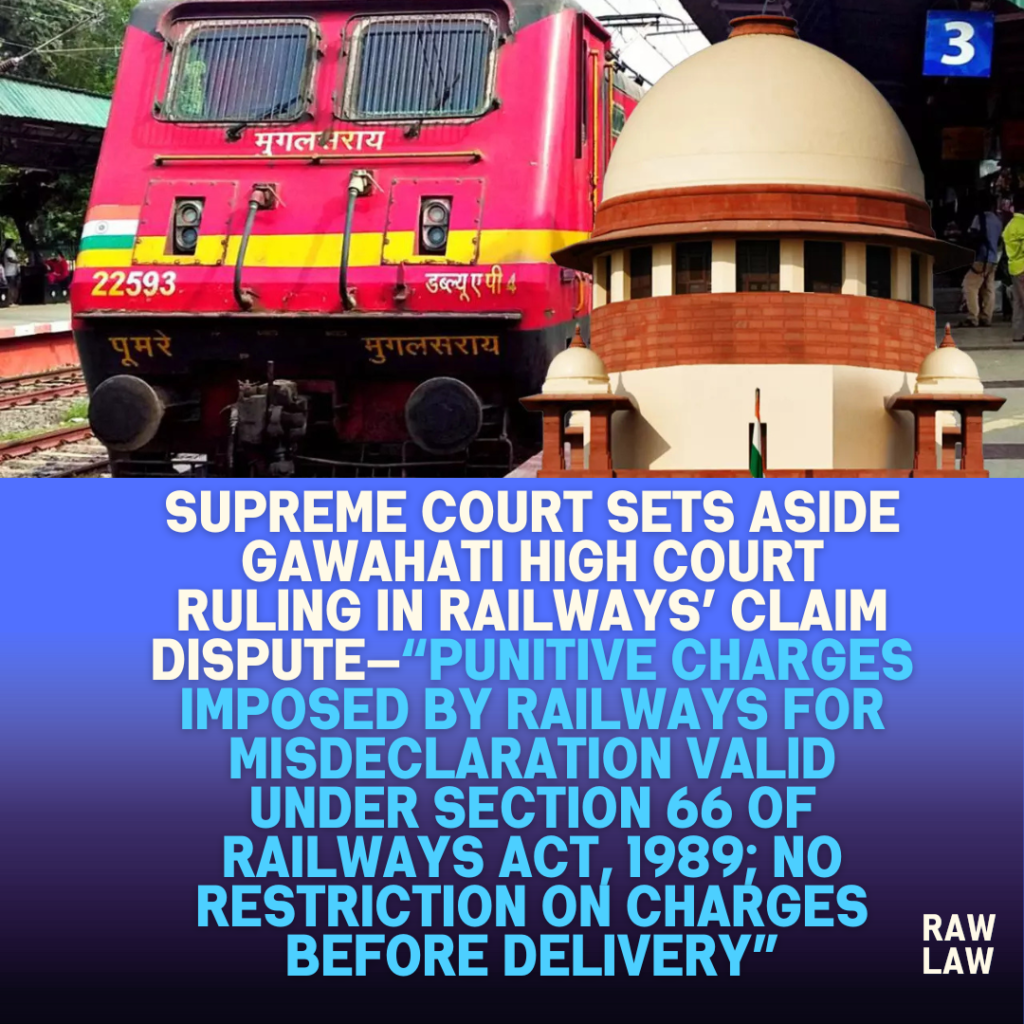Court’s Decision
The Supreme Court of India, in its judgment dated 5 June 2025 in Civil Appeal Nos. 7376–7379 of 2025, allowed the appeals filed by the Union of India against a series of orders passed by the Gawahati High Court and the Railway Claims Tribunal, Guwahati Bench. The Court held that the punitive charges imposed by the Railways for misdeclaration of goods were valid under Section 66 of the Railways Act, 1989, and that nothing in the provision restricts the imposition of charges to only before the delivery of goods.
The Court clarified that the impugned High Court decision erroneously relied upon Section 73 (overloading) and precedents interpreting that section, instead of correctly applying Section 66, which governs misdeclaration. The Supreme Court thus set aside the High Court’s judgment and upheld the Railways’ authority to issue post-delivery demand notices in such cases.
Facts
The Railways had raised demand notices on different dates in 2011 and 2012 against various consignment holders, alleging misdeclaration of goods in consignments transported via Indian Railways. The consignees paid the penal charges as demanded and thereafter filed claim petitions under Section 16 of the Railway Claims Tribunal Act, 1987 before the Guwahati Bench, seeking refunds.
They argued that under Sections 73 and 74 of the Railways Act, the Railways had no power to raise such demands after the delivery of goods. The Tribunal accepted this argument and ordered refunds along with 6% interest. The High Court upheld the Tribunal’s findings and dismissed the Railways’ appeals. Aggrieved, the Union of India approached the Supreme Court.
Issues
Whether the Railway authorities were legally empowered under the Railways Act, 1989, to raise demand notices for misdeclaration of goods after the delivery of goods had been completed?
Petitioner’s Arguments
The Union of India contended that the lower courts had erroneously construed the issue as one of overloading governed by Section 73 of the Railways Act. In contrast, the demand notices were based on misdeclaration of goods, which falls under Section 66. This section allows penal charges to be levied for materially false declarations without any restriction regarding the timing of the charge—before or after delivery.
The appellant further argued that the High Court wrongly relied on Jagjit Cotton Textile Mills v. Chief Commercial Superintendent N.R., a case concerned with overloading and lien rights under different provisions, and did not consider the specific context and text of Section 66.
Respondent’s Arguments
The respondents argued that since the demand notices were raised after the delivery of goods, they were illegal and unsustainable under the Railways Act. They relied on the precedent laid down in Jagjit Cotton Textile Mills, interpreting that penal charges must be raised prior to delivery. They contended that the Tribunal and High Court had rightly applied the law and granted refunds.
Analysis of the Law
The Court undertook a textual analysis of Section 66 of the Railways Act, 1989, which empowers the Railways to require a description of goods for determining carriage rates. If the statement is found to be materially false, the Railways may impose a charge “not exceeding double the highest rate for any class of goods.” Importantly, Section 66 contains no restriction as to when such a charge can be imposed—before or after delivery.
The Court contrasted this with Sections 73 and 78, which deal with overloading and expressly mandate the imposition of penalties before delivery. Since the facts in the present case concerned misdeclaration (not overloading), the Court held that Section 66 applied and there was no violation in raising post-delivery charges.
Precedent Analysis
The Court rejected the reliance placed by the High Court and respondents on Jagjit Cotton Textile Mills v. Chief Commercial Superintendent N.R., (1998) 5 SCC 126. That case dealt with overloading under Section 54 and addressed the right of the Railways to impose conditions for delivery. The relevant para cited only suggests that charges could be imposed before delivery but does not mandate it in all circumstances.
The Supreme Court clarified that the High Court’s interpretation expanded the scope of the ruling in Jagjit Cotton beyond its actual context. Since that judgment pertained to Section 54 and overloading, it had no bearing on Section 66 and the issue of misdeclaration.
Court’s Reasoning
The Court held that since the demand notices arose from misdeclaration, Section 66 applied and not Section 73. There was no reference to overloading either in the demand notices or in the respondents’ claim petitions. The misdeclaration was duly recorded, and the consequential demand was valid even if raised after the delivery of goods.
The Court also found no merit in the argument that the demand notices were not genuine. The respondents had neither denied them in their original claim petitions nor furnished evidence to show that the notices were fabricated.
Further, the Court concluded that the legislative intent behind Section 66 was to allow penal charges for misdeclaration irrespective of the delivery stage. This flexibility ensures that even after the delivery of goods, the Railway administration can recover dues where misdeclaration is detected.
Conclusion
The Supreme Court set aside the Gauhati High Court’s order dated 20 December 2021 and allowed the civil appeals filed by the Union of India. It upheld the demand notices issued by the Railways for misdeclaration and validated the post-delivery imposition of charges under Section 66 of the Railways Act.
Implications
This ruling clarifies that the Railway Administration’s power to raise penal charges for misdeclaration of goods is not confined to the period before delivery. It strengthens the Railways’ authority under Section 66 and ensures that consignees cannot escape liability by misdeclaring goods and taking delivery before inspection.
The decision also restricts the blanket application of precedents dealing with overloading to cases of misdeclaration, providing much-needed doctrinal clarity on the distinct scope of different provisions in the Railways Act.
Also Read: Delhi High Court Denies Bail in ₹78 Crore Money Laundering Case Linked to Illegal Mining



